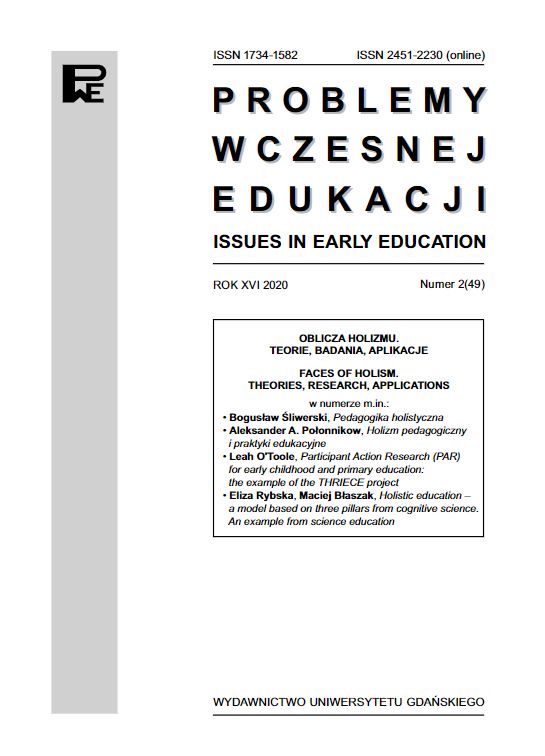Od binarności do nowej fali – między modernizmem a postmodernizmem w nowej socjologii dzieciństwa
DOI:
https://doi.org/10.26881/pwe.2020.49.07Słowa kluczowe:
dziecko, dzieciństwo, nowa socjologia dzieciństwa, modernizm, postmodernizm, holistyczne rozumienie dziecka i dzieciństwaAbstrakt
The area of the author’s investigations is the new study paradigm, known as the new sociology of childhood, formulated at the end of the 20th century. The subject of the author’s interest is one of the currents, known as the new wave, which the author considers in the context of modernism, out of which the current of the new wave has emerged, and postmodernism, which constitutes the significant intellectual background for it. The objective of the article is to depict the way of understanding both the child and childhood contained within the investigative current of the new wave, which has enabled the child to be considered as a fully dimensional and biological, psychological and social being, as well as adaptation of the holistic understanding of childhood as a phenomenon within which culture meets nature, whereas what is social inextricably intertwines with what is natural. The author discusses the modernistic dichotomies, the criticism of which has contributed to the emergence of the new wave of study, within the context of the assumptions of the new sociology of childhood. The author presents conceptual categories which make it possible to get out of dichotomy when describing and analyzing childhood. At the end of the article the author indicates the implications of the assumptions of the new wave analyzed in the article for education of the child.
Downloads
Bibliografia
Alderson P., Goodwin M. (1993), Contradiction within Concepts of Children’s Competence. „International Journal of Children’s Rights”, 1.
Arbiszewski K. (2010), Splatając na nowo ANT. Wstęp. W: B. Latour, Splatając na nowo to, co społeczne. Wprowadzenie do teorii aktora-sieci. Kraków, Universitas.
Bauman Z. (1995), Wieloznaczność nowoczesna. Nowoczesność wieloznaczna. Warszawa, Wydawnictwo Naukowe PWN.
Braidotti R. (2014), Po człowieku. Warszawa, Wydawnictwo Naukowe PWN.
Christensen P., James A., Jenks C. (2000), Home and Movement: children constructing family time. W: S. Holloway, G. Valentine (eds.), Children’s Geographies: living, playing and transforming everyday worlds. London, Routledge.
James A., Jenks C., Prout A. (1998), Theorising Childhood. Cambridge, Polity Press.
Jenks C. (2008), Socjologiczne konstrukty dzieciństwa. W: M.J. Kehily (red.), Wprowadzenie do badań nad dzieciństwem. Kraków, Wydawnictwo WAM.
Kousky C. (2016), Impacts of Natural Disasters on Children. „The Future of Children”, 26(1).
Kowalik-Olubińska M. (2020), Dzieci w obliczu zmiany klimatu – obraz dziecięcej partycypacji w raportach międzynarodowych organizacji pozarządowych. „Forum Pedagogiczne”, 1.
Latour B. (1993), We Have Never Been Modern. Cambridge, Harvard University Press.
Latour B. (2010), Splatając na nowo to, co społeczne. Wprowadzenie do teorii aktora-sieci. Kraków, Universitas.
Lee N. (1998), Towards an Immature Sociology. „The Sociological Review”, 46.
Lee N. (2001), Childhood and society: growing up in an age of uncertainty. Buckingham, Open University Press.
Lenz Taguchi H. (2011), Investigating Learning, Participation and Becoming in Early Childhood Practices with a Relational Materialist Approach. „Global Studies of Childhood”, 1(1).
Mayall B. (2002), Towards a Sociology for Childhood. Buckingham, Open University Press.
Mizen P., Ofosu-Kusi Y. (2010), Asking, giving, receiving: friendship as survival strategy among Accra’s street children. „Childhood”, 17.
Prout A. (2005), The Future of Childhood: towards the interdisciplinary study of children. London, Routledge Falmer.
Prout A. (2011), Taking a Step Away from Modernity: reconsidering the new sociology of childhood. „Global Studies of Childhood”, 1(1).
Prout A., James A. (1990), A New Paradigm for Sociology of Childhood? Provenance, Promise and Problems. W: A. James, A. Prout (eds.), Constructing and Reconstructing Childhood. Contemporary Issues in the Sociological Study of Childhood. London, Falmer Press.
Qvortrup J., Corsaro W.A., Honig M.-S. (2009), Why Social Studies of Childhood? An Introduction to the Handbook. W: J. Qvortrup, W.A. Corsaro, M.-S. Honig (eds.), The Palgrave Handbook of Childhood Studies. Houndmills, Palgrave Macmillan.
Rorty R. (2009), Przygodność, ironia i solidarność. Warszawa, Wydawnictwo W.A.B.
Ryan K. (2012), The new wave of childhood studies: breaking the grip of biosocial dualism? „Childhood”, 19.
Spyrou S. (2019), An Ontological Turn for Childhood Studies? „Children & Society”, 33.
Taylor A., Blaise M., Giungi M. (2013), Haraway’s ‘bag lady story-telling’: relocating childhood and learning within a ‘posthumanist landscape’. „Discourse: Studies in the Cultural Politics of Education”, 34(1).
Taylor A., Pacini-Ketchabaw V. (2015), Learning with Children, Ants, and Worms in the Anthropocene: Towards a Common World Pedagogy of Multispecies Vulnerability. „Pedagogy, Culture & Society”, 24(3).
Tisdall E.K.M., Punch S. (2012), Not So ‘New’? Looking Critically at Childhood Studies. “Children’s Geographies”, 10(3).
Vandenbroeck M., Bouverne-De Bie M. (2006), Children’s Agency and Educational Norms: A tensed negotiation. „Childhood”, 13.
Walkerdine V. (2008), Psychologia rozwojowa i badania dzieciństwa. W: M.J. Kehily (red.), Wprowadzenie do badań nad dzieciństwem. Kraków, Wydawnictwo WAM.

 Uniwersyteckie Czasopisma Naukowe
Uniwersyteckie Czasopisma Naukowe





